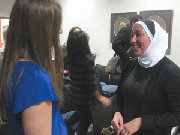ANN ARBOR — A diverse group of audience members came to Haven Hall for an event discussing stereotypes about Muslim women on December 7 at the University of Michigan-Ann Arbor with a host of questions, but the topic of hijabs and veils took center stage during the event, which was hosted by Students for Challenging Perspectives and the Arab American Studies department.

|
| Najah Bazzy (R) speaks with UM student Rebecca Beagan, who helped coordinate the event, in Ann Arbor. Nick Meyer/TAAN |
“I see the hijab as a symbol of love and humility but unfortunately others also see it as something that creates hesitancy and also fear.”
Bazzy is also a trans-cultural nurse clinical specialist and diversity specialist in Dearborn who has addressed similar issues in publications such as The Los Angeles Times, USA Today, and on NPR as well.
She told the diverse crowd, which asked several questions about the subject, that the choice to wear a hijab (Islamic traditional headscarf) is based on a wide variety of different factors.
“What I want you to take home tonight is that it is more than a piece of cotton, it is an identity, and many who wear it love it and feel very strong about their identity in it,” she said.
“There are a billion and a half Muslims and assuming half of them are women, they’re not all going to answer the same; the answer is going to differ from one group to another and one country to another.”
Bazzy has learned a great deal from visiting with citizens from multiple countries with Muslim majorities, and one meeting with women from Afghanistan also drove home the point of dress being a personal choice and the importance of understanding all of the different variables that come into play in the discussion.
“I had advocated against the burqa until I sat down with some Afghani women and heard their story and I can’t tell you how embarrassed I was,” she said.
Bazzy found out from the women that the burqa had been used by the women to hide their physical identity and to keep them safe in the war-torn country, just one of the many examples of the different ways women utilize different styles of dress available to them to feel comfortable.
“I ate my words about my own discussions advocating against it from what I saw on TV; I had strong opinions about something I wasn’t knowledgeable about.”
The discussion was coordinated as part of a final project by student Rebecca Beagan and her group for an Arab American Studies class on campus taught by Nadine Naber.
“We decided to focus on breaking the stereotypes of Muslim women with this event; we chose to launch an educational campaign and wanted to take on the issues of Muslim women, Islam, and Arab Americans from different angles,” Beagan said.
The group also passed out informative fliers about Muslim women including one titled “The Many Faces of Muslim Women” showing the different roles they often play in society and another with little-known facts.
One flier highlighted the key point that Muslim-majority countries have been ruled by women as for much longer than many other societies; another described property rights held by Muslim women that English women for example weren’t able to secure until 1884 giving them rights to their own items independent of male family members and husbands according to Mohja Kahf’s book “Muslim Women Rule.”
An art exhibit entitled “What it Means to Be Arab American” featuring student works at the Duderstadt Center Gallery on campus was another one of the projects Naber’s students undertook as part of the project according to Beagan.
Beagan’s group and the rest of the students had hoped to cover more topics at the discussion, but Bazzy did her best to address the large volume of questions she was asked and many students stayed after to discuss more topics relating to Muslim women as well.
One student asked why Catholic nuns and other strongly religious groups of people are able to dress conservatively without the same questions about repression being raised along with some objections as they are in regards to Muslim women.
“I’ve often wondered a lot about that; it seems nobody has a problem with women taking their clothes off so why would people have a problem with them putting more on? With a Catholic nun or any other person with a religious identity, it’s perfectly acceptable and you expect them to be conservatively clothed.
“I believe it is a very political issue, Islam is the bogeyman they need to have in order to beat the war drums and to have fear, to have an enemy,” Bazzy said.
Bazzy remains hopeful that Muslim women can eventually have a big role in ending the stereotypes placed upon them in the public eye and increasing understanding.
“I believe that Muslim women are going to be the dealbreaker in a positive way in shattering the stereotypes in this country while leading the way in many fields,” she said.
“We need to be patient, and once we make it through I hope that we will be there for the next group that has to take that turn, to be there for the other groups that will have to fight that mis-identity in the future, and I hope we’re up for that challenge,” she said.
People who wish to donate to Bazzy’s Zaman International charity can find more info on zamaninternational.org. Currently, Zaman is tackling numerous projects including the building of water wells in Kenya where women have to walk about four hours a day to obtain water for their families.






Leave a Reply